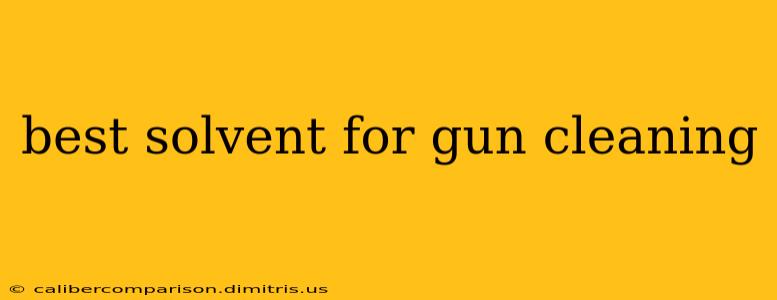Choosing the right solvent for gun cleaning is crucial for maintaining your firearm's performance and longevity. The best solvent depends on several factors, including the type of firearm, the level of fouling, and your personal preferences. This guide will explore various solvents, their pros and cons, and help you determine the optimal choice for your needs.
Understanding Gun Cleaning Solvents
Gun cleaning solvents are designed to dissolve and remove various residues left behind after firing, including:
- Powder residue: Combustion byproducts containing lead, copper, and other metals.
- Carbon fouling: A buildup of carbon deposits that can hinder firearm function.
- Lubricant residue: Excess lubricant that can attract dirt and grime.
- Other contaminants: Dirt, dust, and debris that can enter the firearm during use.
Different solvents possess varying capabilities in addressing these residues. Some are more aggressive, while others are gentler. Choosing the wrong solvent can damage certain firearm components or leave behind harmful residues.
Types of Gun Cleaning Solvents
Several solvent types exist, each with unique properties:
1. Non-Chlorinated Solvents
These are generally considered safer for the environment and less likely to damage certain firearm materials. They're often preferred by many gun owners. Examples include:
- Mineral spirits: A relatively mild solvent effective for removing light to moderate fouling. It's readily available and inexpensive.
- Bore cleaner (non-chlorinated): Commercially available bore cleaners formulated specifically for firearm cleaning, often containing various cleaning agents blended for optimal performance. These are usually more effective than mineral spirits for heavier fouling.
2. Chlorinated Solvents
These solvents are more powerful and effective at dissolving stubborn fouling, particularly lead and copper. However, they are considered more harmful to the environment and may damage certain plastics and finishes. Use caution and follow manufacturer's instructions carefully. Examples include:
- Trichloroethylene (TCE): A powerful solvent once widely used but now largely phased out due to environmental concerns and health risks.
- Other chlorinated solvents: Some commercially available bore cleaners still utilize chlorinated solvents, but their use is decreasing.
3. Specialty Solvents
These are designed for specific tasks or firearm types:
- Copper solvents: Specifically formulated to remove copper fouling from the barrel, often utilizing chemicals like ammonia or other specialized agents. These can be very effective but require careful handling.
- Lead solvents: Designed to remove lead fouling, typically used in conjunction with other cleaning techniques.
Choosing the Right Solvent for Your Needs
The "best" solvent depends on your specific needs:
- For light to moderate fouling: A non-chlorinated bore cleaner or mineral spirits are usually sufficient.
- For heavy fouling: A more aggressive solvent, potentially a chlorinated cleaner (used with caution), or a dedicated copper/lead solvent may be necessary.
- For sensitive firearms: Stick to milder, non-chlorinated solvents to avoid damage to finishes or plastics.
- Environmental considerations: Opt for non-chlorinated solvents whenever possible.
Always refer to your firearm's owner's manual for specific cleaning recommendations. The manual may offer guidance on suitable solvents and cleaning procedures.
Safety Precautions
Regardless of the solvent you choose, always prioritize safety:
- Work in a well-ventilated area: Solvents often release fumes that can be harmful if inhaled.
- Wear appropriate personal protective equipment (PPE): This includes gloves, eye protection, and a respirator if necessary.
- Follow manufacturer's instructions carefully: Pay close attention to usage guidelines and safety warnings.
- Store solvents properly: Keep them in a cool, dry place away from heat sources and children.
- Dispose of solvents responsibly: Follow local regulations for the proper disposal of hazardous waste.
Proper gun cleaning is essential for firearm safety and performance. By selecting the appropriate solvent and following safety precautions, you can ensure your firearms remain in optimal condition for years to come. Remember to always consult your firearm's manual for specific cleaning instructions.

